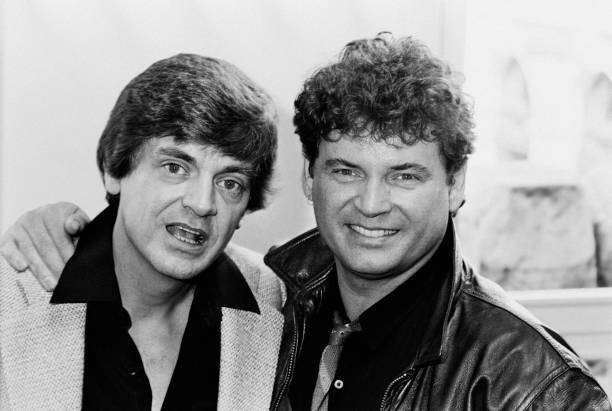 Introduction and Short Summary of the Song
Introduction and Short Summary of the Song
“Don’t Ask Me to Be Friends” is a heartfelt ballad recorded by The Everly Brothers and released in 1962 as a single. Unlike their upbeat rock-and-roll hits or playful teenage love songs, this track takes a more somber, reflective tone. It explores the pain of a breakup where one person suggests friendship, but the other cannot bear the emotional compromise. With its melancholic lyrics, tender delivery, and signature close harmonies, the song exemplifies the Everlys’ ability to capture the nuances of love and heartbreak with authenticity.
Origins of the Song
By 1962, The Everly Brothers were entering a new chapter in their career. They had already secured a place as trailblazers of harmony-driven rock-and-roll with hits like “Bye Bye Love” and “Cathy’s Clown,” but they were also moving toward more mature material that addressed the complexities of adult relationships.
---> Scroll down for the VIDEO
“Don’t Ask Me to Be Friends” was written by Gerry Goffin and Jack Keller, two prominent Brill Building songwriters. Goffin, most famous for his collaborations with Carole King, often wrote songs that reflected emotional honesty and realism. Keller, meanwhile, had a gift for crafting melodies that blended pop sophistication with accessibility. Their collaboration gave the Everlys a song that perfectly suited their evolving style and audience.
Why The Everly Brothers Released “Don’t Ask Me to Be Friends”
The Everly Brothers chose to release “Don’t Ask Me to Be Friends” because it reflected their growing maturity as artists. While their teenage fanbase loved the drama of young romance, the song’s theme of heartbreak and rejection struck a chord with listeners entering adulthood. It demonstrated that Don and Phil were not just performers of teenage anthems but interpreters of more emotionally complex material.
---> Scroll down for the VIDEO
The single also gave them an opportunity to showcase their vocal subtlety. The restrained performance and heartfelt harmonies distinguished the track from the more energetic rock-and-roll hits of the late 1950s.
The Message Conveyed in the Song
The message of “Don’t Ask Me to Be Friends” is about the difficulty of maintaining a friendship after a romantic relationship has ended. The narrator explains that while they still care deeply, pretending to be “just friends” would be too painful.
Key themes include:
-
Heartbreak: The end of a romance brings sorrow and disappointment.
-
Emotional Honesty: The narrator admits they cannot accept friendship as a consolation prize.
-
Love vs. Friendship: The song highlights the tension between lingering love and the desire for closure.
-
Vulnerability: The lyrics reveal the pain of still caring for someone who has moved on.
Its emotional truthfulness makes the song timeless, as many listeners can relate to the struggle of redefining relationships after love fades.
The Recording and Musical Characteristics
“Don’t Ask Me to Be Friends” reflects the Everly Brothers’ gift for subtlety and emotional nuance.
-
Vocals: Don and Phil’s harmonies are softer and more restrained than in their rock hits, emphasizing melancholy and vulnerability.
-
Instrumentation: A gentle arrangement of guitar, strings, and light percussion supports the vocal line without overpowering it.
-
Mood: Reflective, bittersweet, and tender.
-
Style: A pop ballad with country undertones, fitting into the early 1960s shift toward smoother, more orchestrated productions.
The recording avoids dramatic flourishes, allowing the sincerity of the vocals to carry the emotional weight.
Cultural and Commercial Impact
Commercially, “Don’t Ask Me to Be Friends” did not reach the heights of the Everly Brothers’ biggest hits. Released during a time when musical tastes were shifting rapidly and the British Invasion was on the horizon, the song charted modestly but failed to dominate radio in the way their earlier singles had.
Culturally, however, the song revealed another dimension of the Everlys’ artistry. It resonated with listeners who appreciated its honesty and subtlety. Rather than teenage melodrama, it offered a more mature reflection on relationships, demonstrating that the Everlys were capable of growing with their audience.
Legacy of “Don’t Ask Me to Be Friends”
Today, “Don’t Ask Me to Be Friends” is remembered as one of the Everly Brothers’ underrated gems. While it never achieved the iconic status of “All I Have to Do Is Dream” or “Cathy’s Clown,” it exemplifies their ability to interpret emotionally complex material with sincerity and grace.
For their legacy, the song highlights their versatility. They were not only pioneers of harmony-driven rock-and-roll but also skilled interpreters of nuanced ballads written by some of the era’s finest songwriters. The track sits comfortably alongside other Brill Building classics of the early 1960s, bridging the gap between pop sophistication and folk-country honesty.
More broadly, “Don’t Ask Me to Be Friends” reflects the evolution of popular music in the early 1960s, when themes of heartbreak and realism were becoming more common. Its honesty about the impossibility of post-romantic friendship remains relevant to listeners today.
Over sixty years later, the song continues to resonate as a moving reminder of the Everly Brothers’ emotional depth. “Don’t Ask Me to Be Friends” may not have been their biggest hit, but it stands as a timeless testament to their artistry, capturing the heartbreak of love lost with unmatched harmony and sincerity.